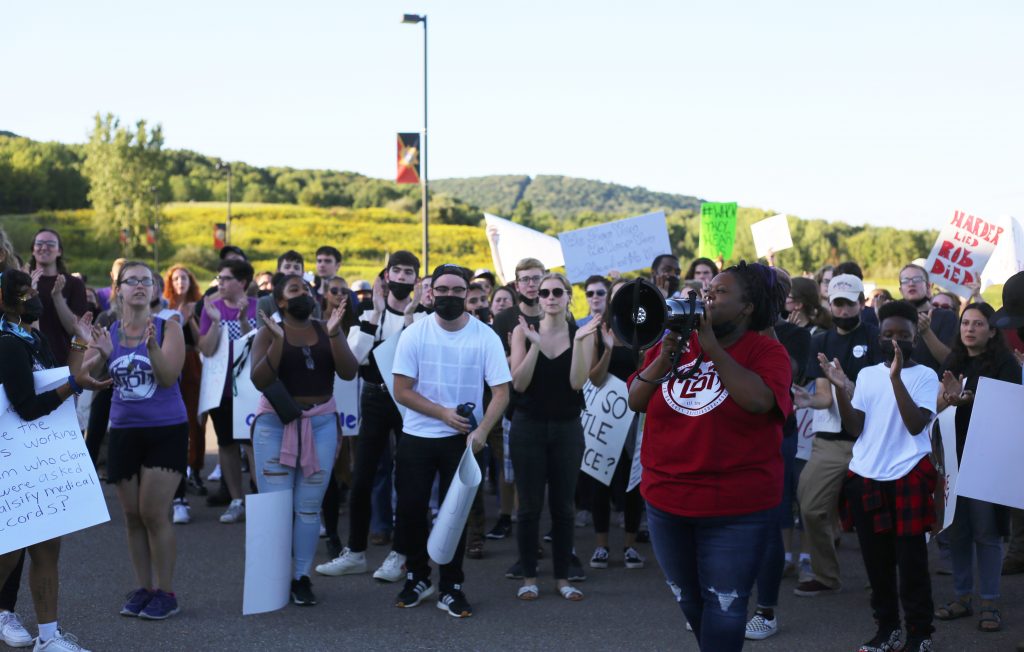
Ten inmates in the Broome Country Jail have died in the past eight years. On Thursday, Binghamton community members, advocacy groups, University students and faculty gathered for the third year in a row to protest the deaths and call for better conditions in the facility.
The rally, held at the jail, is the most recent effort by community organizations to raise awareness and demand action in response to allegations of abuse, medical malpractice and negligence toward inmates of the Broome County Jail at the hands of corrections officers and Dr. Mahmood Butt, the jail’s health administrator.
Alexis Pleus, founder and executive director of Truth Pharm, one of the organizations coordinating the demonstration, said the removal of Sheriff David Harder and jail administrator Mark Smolinsky would be the only way to begin to solve mistreatment of inmates at the jail. Pleus cited examples of inmates being denied medications, proper nutrition and privacy behind the facility’s walls.
“They’re not taking care of inmates — they’re letting people die inside that jail,” Pleus said. “It’s about four times the national average of deaths in a jail of its size. We need somebody in there who recognizes human rights.”
In the past, Harder has vigorously denied claims of mistreatment within the jail, which he directly oversees. His only comment on the protest was that it had disappointed him.
“It’s unfortunate because the people had no idea what they were protesting,” Harder said. “This is not unusual for the organizations involved to spread false information. The people there had no idea what they were saying, and they were believing lies.”
Nearly 200 protesters held signs and stood along the road leading up to the Broome County Jail, periodically breaking out into chants of “No justice, no peace” and “Black lives matter.” Then, on a stage made of wooden pallets stacked on top of milk crates, paired with a PA system, several speakers shared their stories and thoughts on the jail.
One of the speakers, Talon Thomas, 27, of Binghamton, was incarcerated with Salladin Barton, a 35-year-old man who died in solitary confinement at the Broome County Jail in January 2015 while waiting two years for his day in court. Because his cell walls were made of glass, Thomas was able to see Barton in an adjacent cell, and said Barton would often not receive his food or medication because he would be asleep during the times guards brought them out. On another occasion, Thomas said he witnessed Barton being restrained in a stretcher with a straightjacket and propped up behind the corrections officers, who left him there for hours without contact.
“People say ‘[Barton] had this problem, he had that problem’ and he may have had some mental issues, but he didn’t need to be in the Broome County Jail,” Thomas said. “He should have gotten some different type of treatment. He didn’t need to be in the box.”
In a lawsuit filed in the Broome County Supreme Court in 2015 against Harder and Smolinsky, Thomas claimed that throughout his 19-month incarceration, Barton was subject to beatings, deprived of medical care and verbally abused by officials.
“A court document came out [last] week where a judge held them responsible for the past death of Salladin Barton, so we know that even courts are holding them responsible for what goes on inside of the jail,” Pleus said. “They need to leave. We can’t trust them.”
In an Aug. 21 order given by U.S. District Judge David Hurd, the allegations of excessive force and intentional infliction of emotional distress were dismissed, while other allegations, including those of medical mistreatment, are still under review.
Dheiva Moorthy, a student organizer for both BU Progressives and the Frances Beal Society and a sophomore double-majoring in environmental studies and sociology, said she encouraged student involvement in the protest and was there to support the need for alternative reform for inmates.
“The level of neglect for people inside jails is insane,” Moorthy said. “I can’t even begin to tell you how much that hurts my heart, but what’s worse than that is that we don’t have a system of restorative community based healing justice for people. People do not need to be in cages for society to function effectively. People need to be given community healing and people need to be given radical love.”
After the speakers finished, the crowd marched up to the jail and continued their chants. Throughout the day, the prisoners who heard the chants would yell back to acknowledge the protesters. Once they were next to the jail, the group sang “Happy Birthday” for a friend of an organizer who is currently incarcerated in the facility.
“That fact that they heard us, that was the goal,” Pleus said. “Being able to give them a sense of hope is the best thing that we could have accomplished today. They heard us and that was the name of the rally, ‘When They Hear Us.’”
Roderick Douglass, social media coordinator for Progressive Leaders of Tomorrow (PLOT), another organizing group, closed the event by encouraging people to stay involved, find more events and programs to participate in and attend meetings for the involved organizations to continue building a stronger community.
“We’re not trying to get senators to pass laws necessarily — we’re trying to get people on board so that we can force and demand change,” Douglass said. “I promise you, no one is going to die in jail this week and that’s because a lot of people were out here complaining about it. The more people who shed light on what’s happening here, the safer the people are inside.”


